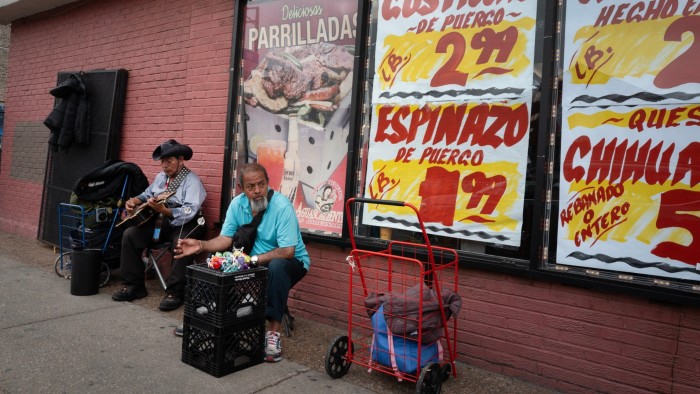Unlock the White House Watch newsletter for free
Your guide to what Trump’s second term means for Washington, business and the world
The writer is a contributing columnist, based in Chicago
A free airplane ticket to any country on earth, $1,000 in cash and a special concierge service at the airport to help those without passports or visas: that’s what the Trump administration is offering an “illegal alien” willing to “self-deport”. “As long as it’s not here, you can go anywhere you want,” the US president promised in a video posted to Truth Social.
But Project Homecoming could prove far from irresistible to many of the estimated 13.7mn undocumented immigrants in the US. On the main street of one of Chicago’s heavily immigrant neighbourhoods last week, reactions ranged from disgust to laughter. I didn’t find any takers.
“Why would people who paid $15,000 to get here leave for $1,000?” asked our local Mexican tamale seller, referring to the high cost of being smuggled illegally into the US. “I think they’re just trying to scare people, I don’t think anybody is going to move to another country for $1,000 when they have their life here,” said the young Mexican dispensing conchas (shell-shaped pastries) at a nearby Oaxacan bakery. Names have been withheld to protect those vulnerable to deportation.
A Venezuelan woman begging outside a grocery store, with her four-year-old son in tow, put it even more bluntly: her eyes opened wide at the thought of what she could do with $1,000 — but going back to Venezuela wasn’t one of them, she said. “I don’t have a home in Venezuela, and there are bad people there,” she said.
The Trump administration has been pushing self-deportation for months, airing menacing advertisements urging illegal immigrants, “Leave now: if you don’t, we will find you and we will deport you”. But experts say it’s impossible to know how many have done so.
The US Department of Homeland Security told me by email that “thousands of illegal aliens” had self-deported using the new CBP Home app, developed by US Customs and Border Protection and successor to CBP One, under which it says 1mn refugees gained entry under the Biden administration. But as Yael Schacher of the non-profit Refugees International pointed out to me: even if true — and many Trump administration statistics are exaggerated — “that’s a drop in the bucket”. “The fact that they are now giving people $1,000 seems to suggest that just telling people to go home has not worked”.
The Migration Policy Institute says that the forced deportation policy is lagging too. The administration “appears on track to deport roughly half a million people this year — fewer than the 685,000 deportations recorded in fiscal year 2024 under President Joe Biden”.
Forced deportation is also expensive. DHS estimates that Project Homecoming will cut by 70 per cent deportation costs of $17,121 per person.
As for the “concierge service”, when I asked US Customs and Border Protection in Chicago how it would work, they had no idea what I was talking about. I referred them to the White House factsheet on the topic. And despite the president’s promise that self-deporters can choose any destination — Libya anyone? — it’s unclear which countries will accept travellers without documents.
The US government is also dangling the promise that those who self-deport could come back one day. But for all its carrots, Project Homecoming also includes sticks: wage garnishment and confiscation of homes and vehicles for those who fail to self-deport — and a $998 a day fine. Immigration lawyers warn that for some, signing up to self-deport could mean being barred from the US for up to 10 years.
Immigrants do sometimes leave voluntarily, often to retire, says Eréndira Rendon of The Resurrection Project, which offers immigration legal services to communities in Chicago. For undocumented immigrants “it’s difficult to age in the US,” she says, because although they pay into Social Security, they do not receive benefits. “But you’re not going to leave all of your dreams, your whole life, for $1,000,” she told me.
Back on our local main street, a Latina tax professional says the only reason a younger person would leave “is if they have no hope”. But she insists “there is still hope for us here in the US”.
“We come here to work and we are resilient. As long as we are able to work in the US, there is no chance we will go back home.”
Source link









